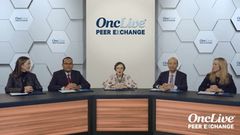
Final Thoughts on the Treatment of Breast Cancer
Episodes in this series

Transcript:
Joyce A. O’Shaughnessy, MD: Well, thank you very much. I think we’ve really covered the waterfront in terms of the most important data coming out of ASCO [the American Society of Clinical Oncology annual meeting] as well as some clinical controversies. But let’s go down the table and just give 1 take-home message perhaps for practice or an exciting observation from ASCO that you think will be particularly useful. Sara, we’ll start with you.
Sara A. Hurvitz, MD: I’m most excited, even though I’m the one who presented MONALEESA-7 and the overall survival data were significant, but I’m more excited that we now have a comparison head-to-head of the CDK4/6 [cyclin-dependent kinases 4 and 6] inhibitor endocrine therapy versus chemotherapy. CDK4/6 inhibitor won from a cross-trial historical comparison. We suspected that would be the case, and now we have evidence. We should all be going to that as our go-to, even in the case of visceral disease.
Joyce A. O’Shaughnessy, MD: Thank you. Aditya?
Aditya Bardia, MD, MPH: I would agree and add another point that overall survival is a very high bar, but if you see that you have a lot of confidence in the drug. In hormone receptor-positive breast cancer, we have overall survival with ribociclib, and in triple-negative breast cancer, we have overall survival with immunotherapy for the PD-L1 [programmed death-ligand 1]—positive subgroup. So there is a lot of excitement with novel agents.
Joyce A. O’Shaughnessy, MD: As we go down the table, I’ll probably take some of your favorite things here, but I think I would emphasize the real need, as we’ve emphasized, for preoperative therapy for HER2 [human epidermal growth factor receptor 2]-positive in particular because of the new data from the KATHERINE trial that led to FDA approval and incorporation into guidelines for the very large impact on disease-free survival. This was utilizing T-DM1 for 14 cycles in those who don’t have a path CR [pathologic complete response]. So we have to give preoperative therapy to know if they have a path CR or not. The same is true for triple-negative breast cancer with regard to the use of capecitabine in patients who have residual disease, per the CREATE-X trial. It’s important to predominantly do preoperative therapy for the HER2-positive and triple-negative patients.
Debu Tripathy, MD: What has struck me at ASCO this time is that we are at an inflection point where we are able to understand translational data and biomarkers at a much higher level. We’re getting much more out of them. The trials are now building them in. Whether you’re talking about HER2 heterogeneity and outcome—which is giving us some clues, and may soon be actionable—or whether you’re talking about next-generation sequencing, 1 thing that was presented last year at ASCO was data from the NCI-MATCH trial.
We heard about, for example, the AKT mutation from Kevin Kalinsky MD and the trial he’s running with capivasertib. There is benefit added to hormonal therapy. We should all be encouraging our patients to participate in trials and to participate in biomarkers. Everybody in academic centers and the community really should be tuned in to the latest in genomics, so that we can start to use this more for trial opportunities and for decision making. I really think that the momentum has picked up, and the rate of discovery is picking up.
Erika P. Hamilton, MD: I’m going to build a little bit on what Debu said, but I think we’re at the point that personalized medicine is really here. It’s not one-size-fits-all for everyone anymore. Whether it’s PI3 kinase or whether it’s PD-L1—positive for atezolizumab, I think makes our jobs harder, because we’re having to tailor for each individual patient. But that’s really encouraging, and I think it’s really optimizing care for the particular patient in front of us instead of a sweeping generalization.
Joyce A. O’Shaughnessy, MD: Well, thank you very much. Thanks for this great contribution. It’s really been fun speaking with you all. On behalf of our panel, we thank you for joining us. We hope you found this OncLive Peer Exchange® discussion to be useful and informative.
Transcript Edited for Clarity





































